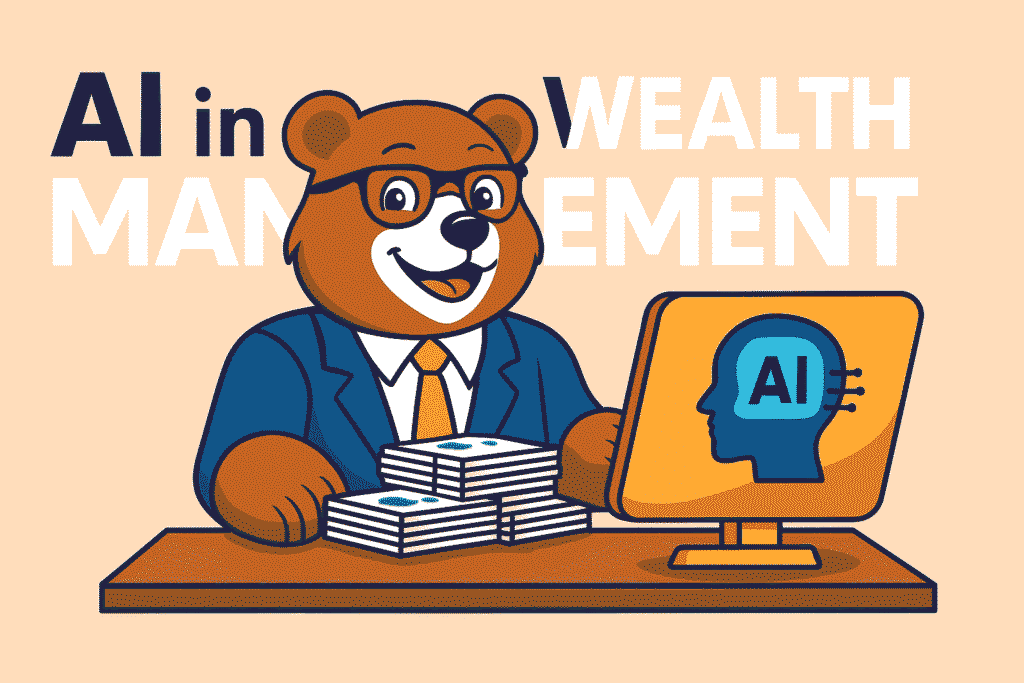Why Everyone’s Talking About It
If you’ve scrolled through LinkedIn or glanced at a financial news site recently, you’ve probably noticed a pattern: everyone is talking about AI in wealth management. And it’s not just hype. From New York to London, technology is rewriting the way we invest, save, and even think about money.
What’s interesting is that AI isn’t just helping the ultra-rich anymore. Tools that once sat behind the closed doors of private banks are now available to young professionals, freelancers, and even students experimenting with robo-advisors.
Where AI Shows Up in Wealth Management

Smarter, More Personal Portfolios
Remember when investment advice boiled down to “low, medium, or high risk”? That’s gone. AI can now dive into your income, habits, and even the way you react to market swings. U.S.-based platforms like Wealthfront and European players such as Nutmeg are building portfolios that feel custom-made—because, in many ways, they are.
Adjustments on the Fly
Markets move quickly, and nobody wants to wait three months for a portfolio review. AI tools rebalance investments instantly and ping investors if something looks off. Instead of “set it and forget it,” it feels more like having a co-pilot who’s always awake.
AI That Talks Back
Here’s where it gets fun: companies are testing chatbots that explain finance in plain English—or even in Gen-Z slang if that’s what you prefer. A good example is Arta Finance, a U.S. startup, which can break down strategies in casual, everyday language. This takes away a lot of the fear people feel when talking about money.
The USA vs Europe Story
AI adoption looks different depending on where you are.
- In the U.S., the culture leans toward rapid adoption. Fintech startups push boundaries fast, and regulators tend to react later. That’s why American users often see new tools before anyone else.
- In Europe, things move at a steadier pace. Privacy laws like GDPR and the upcoming EU AI Act mean financial firms must think carefully before deploying new AI products. At the same time, European investors are deeply focused on sustainable finance, and AI is being used to analyze ESG factors before recommending investments.
Why Clients and Firms Both Care
For clients, the appeal is obvious:
- Advice that feels tailored instead of generic.
- Lower fees compared to traditional advisors.
- Tools that adjust in real time when life changes—say, buying a home or saving for retirement.
For firms, AI isn’t just about client-facing tools. It’s also:
- Cutting costs by automating tasks like compliance paperwork.
- Analyzing mountains of data so advisors can focus on relationships.
- Scaling up—serving hundreds or thousands of clients without burning out staff.
The Flip Side: Risks and Concerns
Of course, no technology is perfect. A few concerns keep coming up:
- Bias in algorithms: If the training data is flawed, the advice may lean unfairly in one direction.
- Trust issues: Many people still want the reassurance of a human advisor, especially during market crashes.
- Regulation: Europe is already strict, and U.S. regulators are catching up. Firms that cut corners could face serious penalties.
What the Future Might Look Like
Looking ahead, three themes stand out:
- Hybrid Advice Models – Imagine an AI tool running the numbers while a human advisor adds empathy and judgment. That balance will likely dominate the next decade.
- Digital Currencies – As the digital euro and possibly a digital dollar arrive, AI will become essential for tracking, managing, and integrating these assets into portfolios.
- Proactive AI – Future systems may not just react but take initiative: flagging tax-saving opportunities or spotting global risks before you do.
Final Word
Whether you’re in San Francisco or Frankfurt, it’s clear that AI in wealth management isn’t just a passing trend. It’s opening doors for everyday investors and pushing firms to rethink how they deliver advice.
If there’s one takeaway, it’s this: the future of wealth management won’t be machines versus humans. It will be machines helping humans make smarter, faster, and hopefully fairer financial decisions.
Read Also : Personal Finance for beginners


Респект за полезный разбор, я сам прям недавно изучал подобное:)